
The Pacific Star is a military campaign medal instituted by the United Kingdom in May 1945 for award to British and Commonwealth forces who served in the Pacific Campaign from 1941 to 1945, during the Second World War.
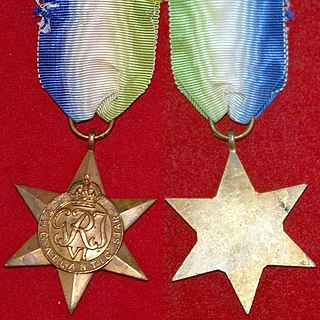
The Atlantic Star is a military campaign medal, instituted by the United Kingdom in May 1945 for award to British Commonwealth forces who took part in the Battle of the Atlantic, the longest continuous campaign of the Second World War.

The 1939–1945 Star is a military campaign medal instituted by the United Kingdom on 8 July 1943 for award to British and Commonwealth forces for service in the Second World War. Two clasps were instituted to be worn on the medal ribbon, Battle of Britain and Bomber Command.
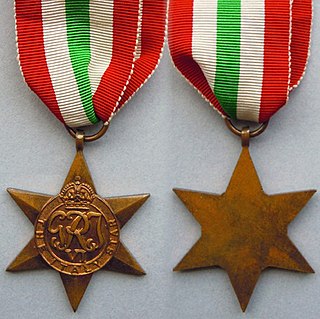
The Italy Star is a military campaign medal, instituted by the United Kingdom in May 1945 for award to British Commonwealth forces who served in the Italian Campaign from 1943 to 1945, during the Second World War.

The France and Germany Star is a military campaign medal, instituted by the United Kingdom in May 1945 for award to British Commonwealth forces who served in France, Belgium, Luxembourg, the Netherlands or Germany and adjacent sea areas between 6 June 1944 and 8 May 1945, during the Second World War.

The Defence Medal is a campaign medal instituted by the United Kingdom in May 1945, to be awarded to citizens of the British Commonwealth for both non-operational military and certain types of civilian war service during the Second World War.
Prior to 1946 the New Zealand armed forces received honours of the United Kingdom, including military decorations and campaign medals. Since the end of World War 2 there have been constant moves towards an independent New Zealand honours system. This has resulted in a new system of New Zealand honours, gallantry and bravery awards, and campaign medals.

The New Zealand Operational Service Medal (NZOSM) is a New Zealand campaign medal for award to New Zealanders who have served on operations since 3 September 1945. Eligibility for the NZ OSM commences the day after the final eligibility date for the 1939 - 45 New Zealand War Service Medal. The medal was instituted in 2002 to provide specific New Zealand recognition for operational service. It is awarded in addition to any New Zealand, Commonwealth or foreign campaign medal. It is awarded once only to an individual, regardless of how many times he or she has deployed on operations.
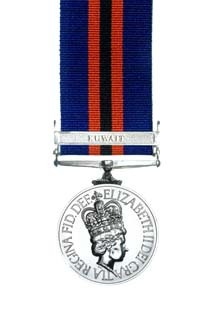
The New Zealand General Service Medal 1992 (Warlike) is a New Zealand campaign medal, authorised in 1992, for award to New Zealanders who have served in warlike operations for which no separate New Zealand or British Commonwealth campaign medal was issued.
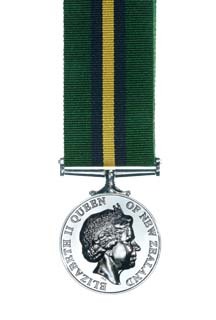
The New Zealand General Service Medal 2002 was a New Zealand campaign medal for service in the Solomon Islands. The medal was awarded for service during Operation Purple Haze 1 and 2, Operation Zephyr, and the International Peace Monitoring Team from 2000 to 2002 and with the Regional Assistance Mission to Solomon Islands (RAMSI) from 2003 to 2013.

The New Zealand General Service Medal 2002 was a New Zealand campaign medal for service in the Iraq.

The New Zealand General Service Medal 1992 (Non-Warlike) is a New Zealand campaign medal, authorised in 1992, for award to New Zealanders who have served in peacekeeping operations for which no separate UN medal was issued.

The General Service Medal, is a campaign medal of the United Kingdom introduced in 1962 to replace both the General Service Medal (1918), as awarded to the Army and RAF, and the Naval General Service Medal (1915). The 1962 GSM was awarded until 2007, when it was replaced by the Operational Service Medal. In 2015 the General Service Medal (2008) was introduced.

The Afghanistan Medal was instituted by Queen Elizabeth II on the advice of the Australian Prime Minister John Howard in 2004. It is awarded to Australian defence force personnel who served in or around Afghanistan after 11 October 2001. Defence force personnel are also recognised by the 'ICAT' clasp to the Australian Active Service Medal and the North Atlantic Treaty Organisation's Non-Article 5 Medal with 'ISAF' clasp.
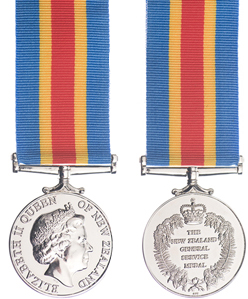
The New Zealand General Service Medal 2002 (Korea) is a New Zealand campaign medal for service in Korea. The New Zealand General Service Medal 2002 was established by royal warrant to recognize service since 2000. The NZGSM 2002 (Korea) was authorized by regulation on 5 September 2008. To qualify for this medal personnel must serve thirty days in the Republic of Korea with the United Nations Command Military Armistice Commission (UNCMAC) or the United Nations Command Honour Guard Company. Only service since 1 January 2001 qualifies. This medal replaces the award of the New Zealand General Service Medal 1992 (Non-Warlike) with the Korea 1958-2000 clasp.

The New Zealand General Service Medal 2002 (Afghanistan) is a campaign medal of New Zealand that recognizes service in the War in Afghanistan. The Queen of New Zealand authorized the creation of a new General Service Medal for the recognition of service taking place after December 2001 with a royal warrant on 23 July 2002. Regulations to establish the NZGSM 2002 (Afghanistan) were published 16 January 2003.

The Australian Operational Service Medal is a campaign medal established on 22 May 2012 to recognise service by Australian Defence Force (ADF) personnel on designated hazardous operations. It may also be awarded to civilians who serve alongside the ADF on designated operations under specific conditions.

The New Zealand General Service Medal 2002 (Counter-Piracy) is a New Zealand campaign medal for service in counter-piracy operations in an area centred on the Arabian Sea. The New Zealand General Service Medal 2002 was established by royal warrant to recognize service since 2000. The NZGSM 2002 (Counter-Piracy) was authorized by regulation on 27 March 2015. To qualify for this medal personnel must serve thirty days in an operational area as a member of a New Zealand Government contribution to a force undertaking counter-piracy operations. Only service on or after 1 January 2009 qualifies. Outside the Arabian Sea other areas of operation include the Gulf of Aden, the Western Indian Ocean, and off the coasts of Somalia, Yemen, and Oman. The earliest large deployment of New Zealand Forces was when HMNZS Te Mana served with Combined Task Force 151 and Operation Ocean Shield from November 2013 to February 2014.

The New Zealand General Service Medal 2002 is a New Zealand campaign medal for service in the Middle East since 7 December 2014.
















